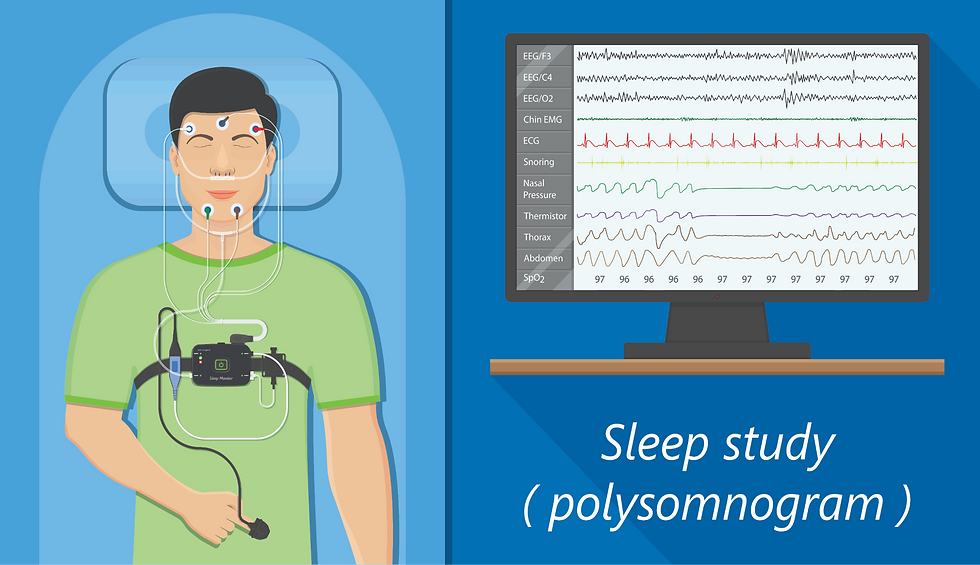Doctor, how well am I sleeping? Do I snore a lot?
- Eric Lim
- Jan 25, 2024
- 1 min read
Dear friends, TGIF once again!
Welcome back to TGIF Dr Euan's blog.

Sleep is a fundamental aspect of our daily lives, and its quality can significantly impact our overall
health and well-being. For many individuals, the quest for good restful sleep is hindered by various
sleep disorders, one of which is Obstructive Sleep Apnea (OSA). OSA is a condition that affects
millions of people worldwide, and it often goes undiagnosed. In this essay, we will explore how OSA
can affect an individual's sleep, leading to periodic awakenings during the night, snoring, and discuss the importance of sleep studies in the assessment of OSA.
Part 1: How OSA Can Affect You
Obstructive Sleep Apnea is a sleep disorder characterized by the repeated cessation of breathing
during sleep due to the collapse of the upper airway. This results in several disruptive effects on
an individual's sleep, including:
1. Periodic Awakenings: OSA leads to brief awakenings during the night. These arousals can be so
brief that individuals may not even remember them, but they disrupt the natural sleep cycle,
preventing the progression to deeper, restorative stages of sleep. Consequently, the person affected
by OSA often experiences daytime fatigue, irritability, and difficulty concentrating.
2. Interrupted Good Night's Rest: OSA disrupts sleep continuity, preventing individuals from
experiencing a good night's rest. The constant cycle of falling asleep, stopping breathing, waking up
briefly to resume normal breathing, and then falling asleep again can lead to poor sleep quality. This
results in sleep fragmentation, leading to an overall sense of unrefreshing sleep, even if the
individual spends an adequate amount of time in bed.
Part 2: How and Why Does Snoring Happen
Snoring is a common symptom associated with OSA. It occurs when there is an obstruction in the
airway during sleep, causing the tissues in the throat to vibrate as air passes through. The exact
reasons for snoring in OSA include:
1. Airway Obstruction: During sleep, the muscles that keep the airway open can relax excessively in
people with OSA. This relaxation can cause the soft tissues in the throat to collapse and partially
block the airway. The turbulent airflow created by this partial obstruction results in snoring.


Image of Normal Airway Image of Airway Obstruction
2. Vibrations: As air attempts to pass through the narrowed airway, it causes the soft palate, uvula,
and other throat structures to vibrate. These vibrations produce the characteristic snoring sound.
The louder and more frequent the snoring, the more likely it is linked to OSA.
3. Snoring as an OSA Indicator: Not all snoring indicates OSA, but it can be a significant sign. The
snoring associated with OSA is often loud and accompanied by choking or gasping sounds as the
individual briefly awakens to restore normal breathing.
Sleep Study Introduction:
To assess and diagnose OSA, sleep studies, also known as polysomnography, are an invaluable tool.
These studies involve monitoring various physiological parameters during sleep to evaluate the
presence and severity of sleep disorders, including OSA. During a sleep study:
1. Electrodes are placed on the scalp, face, and body to record brain activity, eye movements, muscle
activity, and heart rate.
2. A nasal and oral airflow sensor is used to detect snoring and apneas (temporary breathing
cessation).
3. A chest and abdominal movement sensor records respiratory effort.
4. Oxygen saturation is monitored to identify oxygen desaturation during apneas.
Sleep studies help healthcare professionals determine the presence and severity of OSA, which can
guide appropriate treatment options, such as continuous positive airway pressure (CPAP) therapy,
lifestyle modifications, or surgical interventions.

Illustration of a man doing a sleep study at night
In conclusion, OSA can significantly disrupt an individual's sleep, leading to frequent awakenings
during the night, snoring, and a lack of restful sleep. Understanding the relationship between OSA,
snoring, and the importance of sleep studies is crucial in diagnosing and managing this sleep
disorder, ultimately leading to improved sleep quality and overall health.
If you are interested in finding out more about their comprehensive patient-centric services when it comes to sleep, please contact ERIKG Pte Ltd.
Alternatively, if you would like to consult an ENT specialist to understand more about Sleep Apnea, do a sleep study, or any other Ear, Nose, or Throat-related conditions, please feel free to Contact Us at Euan's ENT Surgery & Clinic or call 6694 4282 to make an appointment.
Ultimately untreated OSA is highly detrimental to your health & well-being. OSA should be treated so that you can live a LONG & HEALTHY life!
Have a great weekend ahead!





Comments